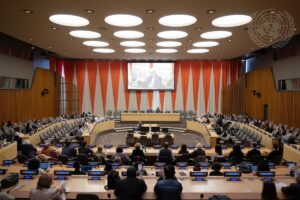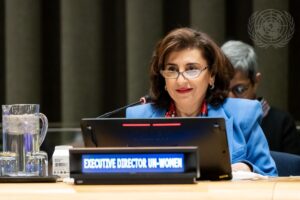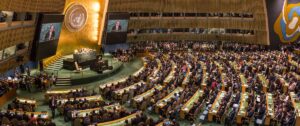
On April 15, 2021, a consortium of independent civil society organizations took part in the fourth roundtable of the “Fulfilling the UN75 Declaration Expert Series,” where thought leaders from global civil society engaged UN Missions and Secretariat officials in a candid dialogue on progress, challenges, and further measures needed to meet two of the twelve commitments presented in the UN75 Declaration. This discussion, sponsored by the Coalition for the UN We Need, Club de Madrid, Together First, and the Stimson Center, addressed the UN75 Declaration commitments #3 on “We will promote peace and prevent conflict” and #4 on “We will abide by international law and ensure justice.”
The series is intended to take stock of progress toward achieving the twelve UN75 Declaration commitments, introduce alternative institutional, policy, and normative measures for improving implementation, and consider steps for achieving such reforms, including a possible follow-on intergovernmental process as recommended in the Eminent Persons Open Letter signed by 49 former world leaders and UN officials. The expert series aims to contribute insights and concrete proposals for consideration in the Secretary-General’s forthcoming (Our Common Agenda) report—expected to be released by September 2021, prior to the UN General Assembly (UNGA) High-Level Week.1The opinions, assessments, valuations, positions and, where applicable, judgements expressed are the responsibility of the authors or the individual persons making the corresponding statements in this publication, which aims to capture and distill, while employing the Chatham House Rule, the ideas conveyed by the 15 April 2021 expert roundtable participants. They do not necessarily and not in every case correspond to the positions and opinions of the event co-sponsors and all participants.
The roundtable’s lead-off speakers included: His Excellency Danilo Türk, former president of Slovenia and president of Club de Madrid; Vasu Gounden, African Centre for the Constructive Resolution of Disputes (ACCORD); Joris Larik, Stimson Center; and (moderator) Natalie Samarasinghe, Together First.
Key Lead-Off Speaker Quotes
“We believe – as far as peace and security is concerned – that the UN needs an updated and coherent conceptual framework for its future activities, as well as understanding what ‘security’ means in the 21st century […] my Club de Madrid colleagues and I identified a number of key elements of such a framework, and that includes also conflict amplifiers and multipliers such as climate change, organized crime, and forced displacement. These are not necessarily priorities on the current UN peace and security agenda, but the UN General Assembly and Security Council have to think more carefully about them and to provide something that we would call a sufficiently robust conceptual framework for peace and security in the future.”
– Danilo Türk
“UN reform needs to be reinvigorated [through] multilateralism […] led by small states. We can’t rely on the superpowers in the world because they are caught in some kind of zero-sum competition. What we need is for small states to step up to the plate and to play some kind of mediating role. Otherwise, we will push the world into a very dangerous schism.”
– Vasu Gounden
“One thing that ties both [peace and rule of law] together is that we live in an era of backsliding both when it comes to issues of peace and stability, as well as to the rule of law and democracy, if we look at the key indicators and indexes in these fields. This is quite a worrying trend in areas where we thought we were making progress.”
– Joris Larik
UN75 Declaration Commitment #3 – We will promote peace and prevent conflict
Major Points Voiced by Participants
- We are operating in a context marked by a perceived emerging new Cold War between neo-liberal democracies and neo-conservative autocracies, each side arguing for why it is a better system or a better paradigm for dealing with conflicts, instability, pandemics, etc. The implications of what peace and security means needs to be closely re-examined, and the nexus between climate change, inequality, and peace and security needs to be considered despite the rivalries of these competing ideological systems.
- It is difficult to confront double standards, especially in relation to the implementation of obligations and agreements by powerful states with respect to treaties, particularly regarding weapons of mass destruction.
- There are instances when non-state actors fill security and public service gaps that are not addressed by local governments. The UN is often unable to engage with these actors because it lacks formal frameworks for dealing with insurgents, multinational organizations, private military companies, and organized criminal organizations.
- Faith needs to be rebuilt in the UN system, not simply through building trust between people and governments, but directly with civil society actors too.
- Peacebuilding is still an art, rather than a science, and it is conducted through trial and error. Better engagement at the local level and a conceptual shift to sustaining peace, prevention, and democracy promotion are at the core of these efforts.
- The Peacebuilding Commission (PBC) has become progressively important in the UN security architecture. As the only peacebuilding body capable of making recommendations to the UN Security Council and the General Assembly, the PBC must become even more influential.
- Prevention should be viewed as an essential part of every commitment in the UN75 Declaration, which broadly cuts across all efforts towards strengthening multilateralism.
- The issues highlighted in the UN75 Declaration are merely a reflection of the areas that unite the UN membership. This means that major challenges, such as non-proliferation and disarmament regimes, are touched upon only very lightly in the Declaration.
- The Peacebuilding Commission is an important instrument for prevention, but it is not the only tool we have for preventive action. We tend to focus too much on country-level efforts for prevention; collaboration with regional and sub-regional organizations deserve more attention.
Recommendations from individual participants: Policy, institutional, legal, normative, and operational reforms
- The Peacebuilding Commission should be upgraded into a Democratic Peacebuilding Council based upon the precedent set by the UN Human Rights Council. It should further monitor early warning indicators of UN member states through a periodic peacebuilding audit, based upon the Human Rights Council’s Universal Periodic Review. One participant cautioned that that a Democratic Peacebuilding Council might be too revolutionary, while suggesting that incremental approaches to reforming the PBC might be more effective.
- Following through on the 2020 Peacebuilding Architecture Review, the PBC’s advisory role to the Security Council and General Assembly should be strengthened to promote greater coherence among development and peacebuilding actions at headquarters and in the field. The PBC should further hold discussions regarding initiatives, progress, challenges, and lessons learned to bring greater attention to cross-cutting issues that receive insufficient attention by the Security Council.
- The PBC must be more active at the regional level by sharing lessons learned, facilitating mutual learning and dialogues, and strengthening inter-regional partnerships while building resilient institutions.
- Mediation capacities need to be approached as a multi-track and multi-stage process in which local efforts are supported with equal importance. Furthermore, digital gaps in mediation need to be addressed, and lessons learned during the pandemic should be applied to mediation efforts.
- The UN’s engagement with local actors should be formalized, based on the UN system-wide community engagement guidelines to aid member states, regional organizations, and other actors in strengthening their partnerships with civil society.
- Prevention is cost-effective, and we must sharpen our instruments on prevention. In this regard, we must promote local ownership. We must focus on people, participation, and partnerships.
- There should be a Global Resilience Council, a new, specialized international body to better address in a coordinated manner non-military threats pertaining to resilience, well-being, and human security at the community level.
- The developed world needs to contribute more peacekeepers to UN missions, and rapid standby peacekeeping forces should be established so that the UN can respond to security threats in weeks, rather than months.
- The UN should engage in cyber-peacekeeping similar to the ways in which it engages in the physical space. Additionally, digital simulations should be developed to educate the public on what it entails to be a UN peacekeeper.
- An international minimum corporate tax could be established on international financial transactions to change the way that the world finances international organizations (including for peacekeeping and peacebuilding), thereby reducing dependency on major donor countries.
UN75 Declaration Commitment #4 – We will abide by international law and ensure justice
Major Points Voiced by Participants
- While advances made over the past decades must be defended, there has been, unfortunately, significant backsliding regarding the rule of law and democracy.
- The International Criminal Court (ICC), International Court of Justice (ICJ), and other tribunals suffer from a significant jurisdiction gap (particularly among large states), an absence of binding treaties or regulatory instruments due to the voluntary nature of the courts, and a general attitude of benign neglect.
- International law cannot deliver justice by itself. We need to step up international cooperation and call on all states to adhere to treaties and become parties to international courts.
- There must be a greater focus on better implementing existing initiatives and instruments, rather than simply creating new tools. We should primarily/systematically take a close look at frameworks that have failed or are failing and ensure that they are made effective.
- Trust needs to be reaffirmed and increased in the international courts and tribunals by implementing international laws and protecting imperiled international norms, agreements, and ensuring universal participation in these institutions. The fundamental role of international (legal) institutions, in particular, must be recognized and respected in ending disputes between states peacefully.
- International law is not viewed by some states on the same terms as national law. It can open a lot of choices to states, and they have the right to decide whether or not to join courts. Furthermore, while withdrawal from treaties is regrettable, can also be a form of changing laws and fomenting reform.
- There is a disconnect between modern international law expertise and practice in The Hague, versus the diplomatic and political processes at the UN. Existing, and particularly older, international legal structures should be strengthened learning from today’s more modern international courts and supra-national courts at the regional level.
- Contemporary international law is often about coordinating national policies and rules, thus making it much more sovereignty intrusive. We do not yet have a mainstream political theory which addresses this, and we also need to explain/address the common time gap between international legal developments and what is happening on the ground in a country.
Recommendations from individual participants: Policy, institutional, legal, normative, and operational reforms
- An International Anti-Corruption Court (IACC) should be formed as a mechanism to hold kleptocratic leaders accountable in countries where domestic authorities are unwilling or politically unable to step in. This court would not only prosecute corrupt officials but would also have the jurisdiction to freeze ill-gotten assets being laundered in the financial systems of IACC member states to be eventually repatriated to the nation from which they were stolen.
- Non-political methods of strengthening the courts should be introduced, such as upgrading or strengthening the ICJ and the UN human rights architecture to be stronger rule-based and impartial expert/technical bodies, while simultaneously, for example, establishing an International Judicial Training Institute.
- There should be a global campaign to better understand and address the hesitancies of the one-hundred or so countries which do not accept the compulsory jurisdiction of the ICJ and have not joined the ICC, with a goal of getting at least 50 percent of the world’s nations onboard. Courts will gain legitimacy through greater inclusion, resilience against political pressure, and greater ability to enforce the rule of law, creating normative pressure on great powers to participate and support the upgraded international legal system.
- International courts should enhance options beyond simply judicial settlement. Methods of peaceful settlement of disputes include arbitration, reconciliation, and more. Also, a compulsory dispute settlement could serve as an effective way of ending disagreements between nations when diplomacy fails (e.g., through a strengthening of Chapter VI of the Charter or its implementation).
- There is a need to energize the progressive development of the rule of law in every domain, such as at sea and in space, but particularly in areas of rapid technological development, such as artificial intelligence and internet governance.
- The recommendations proposed in this roundtable should be addressed at the UN General Assembly, but also in the UN’s High-Level Political Forum on Sustainable Development, since SDG16 (on peace, justice, and inclusive governance) clearly mentions the importance of strong and independent judicial institutions.
Participant List
Mavic Cabrera Balleza, Founder and CEO, Global Network of Women Peacebuilders
Agustina Briano, Outreach and Development Coordinator, Club de Madrid
Henk-Jan Brinkman, Chief, Peacebuilding Strategy and Partnerships, UN Peacebuilding Support Office
Hillel Joseph Cohen, Political Advisor, Permanent Delegation of Liechtenstein to the United Nations
Sapna Considine, Director, Strategy for Humanity
Luis Consuegra, Strategic Partnerships and Outreach Advisor, International IDEA
Amb. María Bassols Delgado, Ambassador, Deputy Permanent Representative, Permanent Mission of Spain to the United Nations
Walter Dorn, President, World Federalist Movement Canada
Justice Richard Goldstone, Member of the Board, Integrity Initiatives International
Vasu Gounden, Founder and Executive Director, ACCORD
Maja Groff, Fmr. Principal Legal Officer, Hague Conference on Private International Law, Visiting Professor/Scholar, Faculty of Governance and Global Affairs, Leiden University
Sigrid Gruener, Program Director, Dag Hammarskjöld Foundation Henrik Hammargren, Executive Director, Dag Hammarskjöld Foundation
Idayat Hassan, Director, Centre for Democracy and Development
Faisal M. Al-Hababi, Assistant Professor of Public Law, Qatar University College of Law
María Antonieta Socorro Jáquez Huacuja, Minister Counsellor, Mission of Mexico to the United Nations
Hawanatu Kebbe, Legal Expert, Permanent Mission of Sierra Leone to the United Nations
Georgios Kostakos, Executive Director, Foundation for Global Governance and Sustainability
Marina Kumskova, Senior UN Advocacy and Policy Advisor, Global Partnership for the Prevention of Armed Conflict
Joris Larik, Senior Advisor and Nonresident Fellow, Stimson Center and Assistant Professor, Leiden University
Guillemot Le Bourhis, Executive Office of the Secretary-General, United Nations
Michael Liu, Executive-Director, Chinese International Law Initiative
Nuno Mathias, Deputy Permanent Representative, Permanent Mission of Portugal to the United Nations
Anja Mihr, Program Director, Center on Governance through Human Rights; Humboldt-Viadrina Governance Platform
Amb. Michal Mlynar, Permanent Representative, Permanent Mission of Slovakia to the United Nations
Peter Nagy, Legal Adviser, Permanent Mission of the Slovak Republic to the United Nations
Sumie Nakaya, Organizational Resilience Program Manager/Focal Point for Security, Department of Peace Operations, United Nations
Vitorino Mello Oliveira, First Secretary, Permanent Mission of Portugal to the United Nations
Savita Pawnday, Deputy Executive Director, Global Centre for the Responsibility to Protect
Cristina Petcu, Research Analyst, Global Governance, Justice & Security Program, The Stimson Center
Richard Ponzio, Senior Fellow and Director, Global Governance, Justice & Security Program, The Stimson Center
Simona Popan, Head of Legal Section, Delegation of the European Union to the United Nations
Arnold Pronto, Principal Legal Officer, Codification Division, Office of Legal Affairs, United Nations
Lukas Prvy, Legal Adviser, Permanent Mission of the Slovak Republic to the United Nations
Marisha Ramdeen, Senior Programme Officer, ACCORD
Megan Roberts, Director of Policy Planning, United Nations Foundation
Natalie Samarasinghe, Executive Director, United Nations Association – UK (UNA-UK)
Danilo Türk, Former President of Slovenia and Member of Club de Madrid
Zach Vertin, Senior Advisor, Permanent Mission of the United States of America to the UN
Hoyumi Yashiro, Advisor, Political Section, Permanent Mission of Japan to the United Nations
[1] The opinions, assessments, valuations, positions and, where applicable, judgements expressed are the responsibility of the authors or the individual persons making the corresponding statements in this publication, which aims to capture and distill, while employing the Chatham House Rule, the ideas conveyed by the 15 April 2021 expert roundtable participants. They do not necessarily and not in every case correspond to the positions and opinions of the event co-sponsors and all participants.
Notes
- 1The opinions, assessments, valuations, positions and, where applicable, judgements expressed are the responsibility of the authors or the individual persons making the corresponding statements in this publication, which aims to capture and distill, while employing the Chatham House Rule, the ideas conveyed by the 15 April 2021 expert roundtable participants. They do not necessarily and not in every case correspond to the positions and opinions of the event co-sponsors and all participants.



